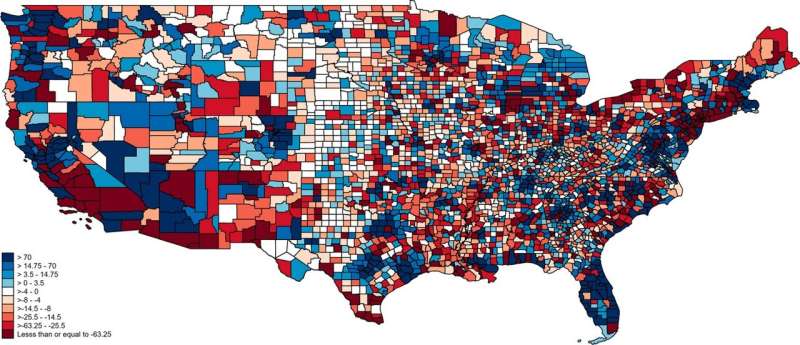This article has been reviewed according to Science X's editorial process and policies. Editors have highlighted the following attributes while ensuring the content's credibility:
fact-checked
trusted source
proofread
Pollution drives families to relocate—but only the rich can afford to live in healthier areas

Pollution levels factor in households' decision to relocate within the United States, but only richer households can afford areas with improved air quality, a new study finds.
Research led by Lancaster University Management School and published in Environmental and Resource Economics, examines county-to-county migration data from 2010 to 2014 provided by the US Internal Revenue Service (IRS). It uses a range of controls to account for households opting to move to a particular county—such as employment opportunities and amenities—and finds environmental quality plays a key role in a choice of destination.
"We believe our study is the first to examine both household income and environmental quality in households' decisions to relocate," Lancaster University's Dr. Aurelie Slechten, co-author of the study, explains.
"We find inequalities exist when it comes to who is exposed to the worst areas of pollution—with poorer families hit hardest. Richer households opt to move into cleaner, healthier areas that tend to be more expensive. However poorer families are priced out of these counties and are the ones who move into areas with higher levels of toxic releases."
Analyzing detailed origin and destination information of households, rather than just aggregate migration flows, the new analysis uncovers a direct link between a household's income and their new chosen county of residence. Those who leave an area for a location that is less polluted earn more than the average household in their home community, whereas households earning a less than average income in their home area are the ones to move to more polluted destinations.
"This evidence demonstrates it is not just improvements to air quality standards and Toxic Release Inventory reporting that are important when it comes to environmental justice—inequality in income also needs to be considered, as it is clear some families may be forced to live in more polluted areas which may lead them to live unhealthier lives," co-author Dr. Anita Schiller, of Lancaster University, adds.
This new paper builds on the academics' earlier study that looked at the behaviors of firms that cause pollution to discover if these organizations make strategic decisions on their site locations based on population demographics. Focusing on Texas, they found a correlation between lower income locations and the probability of potentially polluting firms choosing to locate there.
Professor Dakshina De Silva of Lancaster University Management School is co-author of the study. He said, "This creates a vicious cycle where firms strategically locate polluting facilities in lower-income areas, and the resulting environmental burdens then fall disproportionately on disadvantaged communities. Wealthier households, meanwhile, are able to effectively 'vote with their feet' and avoid these negative impacts.
"Addressing both environmental justice and economic inequality is crucial to break this cycle and create more sustainable communities for all."
The new paper, "Tiebout Sorting and Toxic Releases" is written by Professor Dakshina De Silva; Dr. Anita Schiller and Dr. Aurelie Slechten from Lancaster University Management School and Dr. Leonard Wolk from Vrije Universiteit Amsterdam.
More information: Dakshina G. De Silva et al, Tiebout Sorting and Toxic Releases, Environmental and Resource Economics (2024). DOI: 10.1007/s10640-024-00893-8
Provided by Lancaster University





















